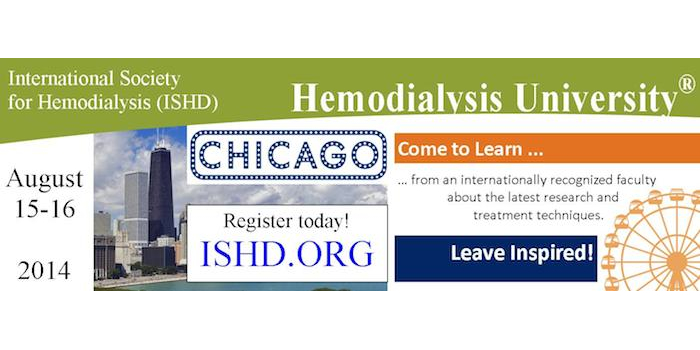Back to School: Hemodialysis University

The International Society for Hemodialysis (ISHD) is hosting the 4th Hemodialysis University (HDU) at Chicago on August 15-16 th, 2014 (visit ishd.org for details). Meant for the busy practitioner as well as nephrology fellows this course offers a rare opportunity to get the latest updates in the field of hemodialysis from a group of renowned hemodialysis experts in an informal setting. The lecture format will encourage audience participation (audience response systems will be widely used) to maximize benefits to attendees.
The HDU was launched in 2012 at Chicago as one of the ISHD's prime educational initiatives. After its resounding success, successive HDUs were held in Shanghai and India in September 2013 and February 2014, respectively.
One of the major areas of focus for the ISHD has been to promote education and research in Hemodialysis. In that regard, this course will make a focused attempt to address the issue of Home Hemodialysis besides various other emerging issues. Of special interest will be a unique web based “Home Hemodialysis toolkit” co-sponsored by ISHD. It is a “how-to” manual developed by a group of world experts in Home HD. Dr. Chris Chan will present an overview of this valuable tool kit during the 4th HDU for the first time. There will be several other key talks in the field of Home Hemodialysis including the ones by Drs. Brent Miller, Whitier, and Lindley touching upon several interesting aspects. Dr. Bill Whittier is going to be discussing the NxStage Kidney Care home dialysis center approach and what he is setting up in the Chicago area.
Dr. Chris McIntyre has been looking at the benefits of slightly cooler dialysate (he measures tympanic membrane temperature and sets dialysate at 0.5 degrees C lower than this temperature). He now shows that this simple maneuver largely eliminates heart stunning and also brain white matter disorganization due to ischemia (the latter linked to depression and cognitive defects). Drs. James Tattersall and Elizabeth Lindley from the UK will be presenting how bioelectrical impedance analysis (BIA) has helped them in their unit to optimize postdialysis weight. They find that an important of subset of patients is too dry and appears to have high interdialytic weight gain to climb back to their optimum weight. When, based on BIA, they increase the post dialysis weight to more optimum levels, the IDWG is reduced— and several patients had resumption of residual kidney function, to the point that they were able to get off dialysis. There are a number of other key presentations.
Dr. Jose Diaz-Buxo is going to talk about sorbents and the new sorbent-based in-center and home dialysis machines that Fresenius is developing. Drs. Peter Kotanko and Tattersall are going to be talking about new AI-type protocols to minimize AI use, and Dr. Dan Coyne, in his overview of anemia treatment will also be discussing the new iron-based phosphate binders. There also is a very useful section on venous catheters. Dr. Ted Clark from Canada will discuss their use in an acute setting, and will discuss some work he has done regarding training fellows in catheter insertion via simulation training. Finally, Michele Mokrzycki will talk about management options to deal with infected catheters.
This is going to be a great educational event, not to be missed!


Comments